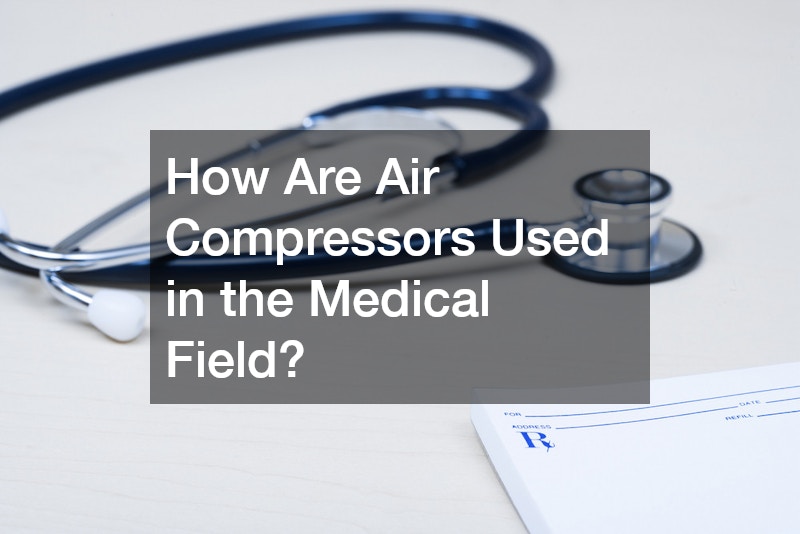
Air compressors play a crucial role in a variety of industries, and the medical field is no exception. In healthcare settings, air compressors are integral to the operation of many essential systems and equipment. From providing clean air for respiratory treatments to powering surgical tools, air compressors ensure that medical facilities run smoothly and safely. The use of specialized medical air compressors is vital in delivering sterile, breathable air to patients and powering critical devices. Let’s explore how air compressors are utilized in the medical field and why they are so important.
1. Providing Clean and Sterile Air for Respiratory Support
One of the primary applications of an air compressor is to deliver clean, compressed air to patients requiring respiratory support. In hospitals, clinics, and even in-home care, patients suffering from respiratory issues such as asthma, chronic obstructive pulmonary disease (COPD), and other lung-related conditions often rely on devices like ventilators and oxygen concentrators. These devices use air compressors to provide a continuous flow of purified air, free from contaminants, to help patients breathe easier.
These industry-specific air compressors are designed to meet stringent standards, ensuring the air delivered to patients is sterile and safe for breathing. This is critical in medical settings where the presence of contaminants in the air could lead to infections or complications for already vulnerable patients. Unlike standard industrial air compressors, medical air compressors are built with advanced filtration systems to remove particulates, moisture, and oil, ensuring the highest level of air quality.
2. Powering Surgical Tools and Equipment
In addition to respiratory support, medical air compressors are often used to power a wide range of surgical tools and equipment. Many surgical instruments, such as drills, saws, and other cutting tools, require compressed air to function efficiently. These pneumatic tools are often preferred in surgery because they provide greater precision and control compared to electric alternatives, which can generate heat and pose a higher risk of complications.
A medical air compressor provides the necessary power to operate these tools in a safe and consistent manner. For example, during orthopedic surgeries, surgeons rely on pneumatic drills to make precise cuts in bone, and dental surgeries often use compressed air to power high-speed handpieces. The reliability of a medical air compressor in these scenarios ensures that surgeons can perform delicate procedures with confidence, minimizing the risk of errors.
3. Delivering Anesthesia
Another important application of air compressors in the medical field is in the delivery of anesthesia. During surgical procedures, anesthesiologists use medical air compressors to mix gases, such as oxygen and nitrous oxide, which are then delivered to the patient through a breathing mask or tube. The compressed air ensures that the right mix of gases is administered at the correct pressure, allowing the patient to remain unconscious and pain-free throughout the procedure.
The precise control of airflow provided by these compressors is essential in anesthesia administration. Any deviation in the flow or composition of gases can lead to complications, so it is critical that the compressors used in these systems are highly reliable and able to maintain consistent pressure and purity. Additionally, medical air compressors are designed to be quiet and vibration-free, which helps maintain a calm environment in the operating room.
4. Sterilization of Medical Instruments
Maintaining a sterile environment is critical in any healthcare setting, and air compressors play a role in ensuring that medical instruments are properly sterilized. Autoclaves, which are used to sterilize surgical instruments and other medical tools, rely on compressed air to create the high-pressure steam required to kill bacteria, viruses, and other pathogens.
A medical air compressor provides the necessary power to generate steam at the required temperature and pressure, ensuring that instruments are thoroughly sterilized before being used on patients. By ensuring that medical tools are free from contamination, medical air compressors help prevent the spread of infections and ensure the safety of both patients and healthcare providers.
5. Assisting with Laboratory and Diagnostic Equipment
In medical laboratories, compressed air is used in a variety of diagnostic equipment, including gas analyzers and laboratory testing machines. These devices require clean and dry compressed air to function accurately, as contaminants in the air could lead to erroneous test results. Whether it’s used to power automated lab machines or to provide air for precise calibration of diagnostic tools, an air compressor is essential for maintaining the integrity of medical testing.
Additionally, compressed air is often used in imaging technology, such as MRI machines and X-ray equipment, to cool and maintain the proper functioning of the systems. A stable supply of clean, compressed air ensures these machines can run continuously without overheating, allowing for accurate and reliable diagnostic imaging.
6. Supporting Dental Procedures

In dental practices, air compressors are commonly used to power various dental tools, such as drills, suction systems, and air-water syringes. Dentists rely on compressed air to operate their tools with precision and maintain a dry and clear working area in the patient’s mouth. Since dental procedures often require a high degree of accuracy, a medical air compressor ensures that dental professionals have the power they need to perform effectively and efficiently.
Moreover, like other medical fields, dental air compressors must meet strict hygiene standards. The air provided by the compressor must be free from contaminants to prevent infections and ensure a safe environment for patients undergoing dental treatment.
